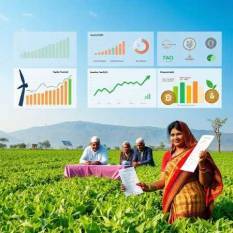MUMBAI, 18 June 2025: In a landmark step towards integrating climate finance with sustainable farming, the National Bank for Agriculture and Rural Development (NABARD) and the Food and Agriculture Organization (FAO) of the United Nations co-hosted a one-day workshop in Mumbai on June 16, 2025.
The event aimed to operationalize their recently signed Memorandum of Understanding (MoU), setting the stage for innovative climate-resilient agriculture initiatives and carbon market mechanisms across India.
With more than 60% of India’s land under cultivation and nearly half the workforce dependent on agriculture, building climate resilience is both a national priority and an economic necessity. Through this collaboration, NABARD and FAO plan to design and scale financial instruments that reward farmers for sustainable practices while boosting India’s green transition goals.
INR 300 Crore Carbon Fund Announced
Delivering the keynote address, Shaji KV, Chairman of NABARD, underscored the urgency of placing India’s agriculture sector at the forefront of global climate resilience. He announced the launch of a INR 300 crore Carbon Fund to support early-stage investments in projects capable of generating high-quality carbon credits. The fund is intended to de-risk investments, encourage private sector participation, and empower Farmer Producer Organizations (FPOs) as key players in the emerging carbon economy.
Shaji emphasized the strategic value of partnering with FAO to access global expertise, helping to contextualize advanced carbon finance frameworks for India’s rural economy. “NABARD is willing to take calculated risks to catalyze innovation in climate finance and ensure FPOs and cooperatives become credible project developers,” he said.
FAO Calls for Inclusive Carbon Markets
FAO’s India Representative, Takayuki Hagiwara, echoed these sentiments, highlighting the importance of equity and inclusivity. “Smallholder farmers must be the principal beneficiaries of carbon credit revenues,” Hagiwara said. He stressed that the India Carbon Fund must be simple, transparent, and accessible, especially for marginal and resource-poor farmers.
He added that FPOs have the potential to become catalytic agents in organizing farmers and enabling their participation in voluntary carbon markets, thereby sparking systemic change in rural India. “This isn’t just about carbon—it’s about redefining rural development through sustainable growth,” he noted.
Three Strategic Focus Areas
The workshop revolved around three key pillars:
- Operationalizing the NABARD–FAO MoU through a jointly developed action plan
- Designing the India Voluntary Carbon Fund (IVCF) to support scalable agricultural carbon initiatives
- Developing a Green Climate Fund (GCF) concept note to improve India’s access to global climate finance
Technical discussions explored innovative financial instruments to mobilize public, private, and philanthropic capital. Participants emphasized the need to ensure that access to carbon markets remains smallholder-friendly, while building the institutional capacity of FPOs to act as trusted project developers.
Towards a Low-Carbon, Farmer-Centric Future
The workshop concluded with both NABARD and FAO reaffirming their commitment to build climate-smart, inclusive, and innovative agri-finance systems. Senior leadership teams from both institutions pledged to co-create a joint strategy and operational roadmap for transforming India’s agrifood systems through sustainable investments.
This NABARD–FAO initiative represents a pivotal moment in aligning India’s agricultural future with climate action, green finance, and rural transformation, ensuring smallholders are not just part of the solution—but at the center of the change.




















